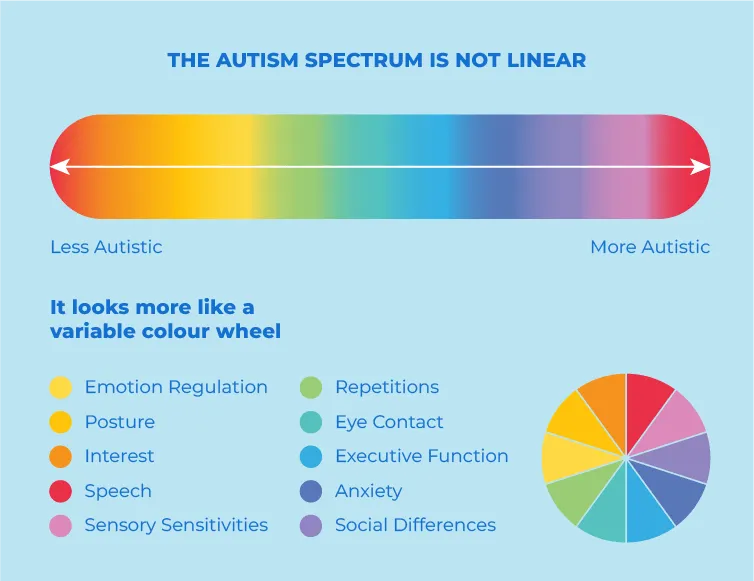Autism & ADHD Support Services
Living with Autism or ADHD, or supporting a child who is can sometimes feel overwhelming. You might recognise traits like difficulty focusing, needing strict routines, masking to “fit in,” or feeling overstimulated by busy environments. You might also notice incredible strengths: creativity, deep focus on passions, empathy, or a unique way of seeing the world.
But when daily life, school, work, or relationships start to feel harder than they need to, the right support can make all the difference. That’s where I come in.
What Is Autism?
Autism, or Autism Spectrum Disorder (ASD), is a lifelong developmental condition that affects how a person experiences the world around them. It influences how people communicate, interact socially, process information, and respond to their environment. Autism is not an illness or something that needs to be "cured", it’s simply a different way of thinking, feeling, and behaving.
The 'Spectrum'
The term “spectrum” means that autism affects each person differently. Some autistic people need little or no support in daily life, while others may need more help, especially with communication, routines, or sensory sensitivities. No two autistic people are exactly the same. Autism can range from subtle differences to more noticeable challenges, and abilities can vary widely even within the same individual. Autism is not linear and strengths and challenges vary which is the same as the ‘neurotypical’ population.
"FND tics can appear suddenly, usually in teens/adults, and may come with other neurological symptoms such as non-epileptic seizures or tremors."

Understanding the signs of Autism
Autism and ADHD are neurodevelopmental conditions, not illnesses. They shape how people think, feel, and experience the world. Everyone’s profile is different, no two people with Autism or ADHD are the same.
Autism often involves differences in communication, social interaction, sensory processing, and routines.
ADHD is usually linked to attention, focus, organisation, and impulsivity—but can also bring high energy, creativity, and problem-solving skills.
Many people have traits of both, which can make daily life a mix of strengths and struggles.
In Children
Speech and language differences
(delays or advanced skills)
Avoiding or maintaining intense eye contact
Repetitive play or strong need for routines
Sensitivity to lights, sounds, or textures
Emotional overwhelm, meltdowns, or difficulty
naming feelings
In Adults
Challenges with friendships or relationships
Needing routines and predictability
(while ADHD may also crave novelty)
Feeling drained after socialising (masking)
Overwhelm in busy environments
Difficulty with organisation, focus, or managing daily responsibilities
"These traits don’t mean something is 'wrong.' They just mean your brain works differently. Sometimes, though, these differences can feel exhausting without the right support."
While autism can come with challenges, it can also come with many strengths:
✔ Deep focus and attention to detail.
✔ Strong memory, especially for facts or patterns.
✔ Creative or unique ways of thinking.
✔ Honesty and reliability.
Every autistic person is different, and their strengths can shine in various areas of life, education, or work. Coaching can help to identify those strengths and leverage them.
How Autism Is Diagnosed
in the UK
The first step is to visit your GP. They may refer you to a specialist team for assessment if you are an adult. Often, the school needs to refer to start the process of a diagnosis for a child. You can also access support privately and find a trusted provider who can provide the relevant diagnosis criteria and assessment.
Ask your GP about 'Right to Choose'. This can speed up the diagnosis process and give you options to choose your preferred service.
Depending on age, referrals go to paediatricians (for children), CAMHS, psychiatrists, or autism assessment teams. A team of professionals will gather information through:
Developmental and medical history, Behavioural observations, standard tools like ADOS or ADI-R, Input from schools or family (for children) If autism criteria are met (ICD-11 or DSM-5), a diagnosis is given along with a written report.
Understanding AuDHD
(Autism & ADHD Overlap)
What Is AuDHD?
Many people live with both Autism and ADHD — this is known as AuDHD, or a co-occurring/dual diagnosis. While each condition is distinct, they often overlap in how they affect attention, emotion, and sensory processing.
ADHD can sometimes mask Autism, as the ADHD traits (such as impulsivity or restlessness) tend to be more visible. Once ADHD is identified and supported, people often begin noticing more autistic traits and seek further assessment or diagnosis.
Masking and Misdiagnosis
Many autistic individuals mask their traits, often without realising. This can make diagnosis harder, especially when ADHD or other conditions like Tourette’s are also present. Traditional strategies designed for one neurotype may not work for the other — which is why bespoke, integrated approaches are essential.
Why Awareness Matters
Recognising both conditions allows for more compassionate understanding and effective support. Knowing you may be AuDHD can help you advocate for your needs at school, work, or home, and explore strategies that help balance both neurotypes.
Living With AuDHD
How It May Present
When Autism and ADHD occur together, a person might:
✔ Struggle to focus or daydream often.
✔ Feel both energetic and easily overwhelmed.
✔ Experience strong emotions and find them difficult to manage.
✔ Switch quickly between interests or hyperfocus deeply.
✔ Find hobbies hard to maintain.
✔ Face social challenges from both impulsivity and communication differences.
✔ Feel torn between a need for novelty (ADHD) and predictability (Autism).
✔ Be at higher risk of burnout, anxiety, or depression due to unmet needs.
Finding Balance
Living with AuDHD can feel like an internal tug of war, where two sets of needs constantly compete. With understanding and tailored strategies, individuals can learn how their neurotypes interact and create bespoke routines, sensory supports, and coping tools to stay regulated.
The Power of Acceptance
Autism and ADHD are not problems to be fixed — they’re different ways of experiencing the world. Through awareness, understanding, and acceptance, we can build environments that celebrate neurodiversity and help people of all ages thrive.
How Can We Help?
We offer specialised coaching and support for autistic and ADHD individuals, as well as parents navigating diagnosis and everyday challenges with their children.
Our approach includes:
✔ Helping you understand traits and patterns so they feel less confusing and more manageable.
✔ Offering practical tools for daily life (organisation, routines, emotional regulation).
✔ Supporting parents to feel confident in advocating for their child at school or with professionals.
✔ Building on strengths and passions so neurodivergence becomes a superpower, not a setback
✔ Providing a safe, non-judgemental space where you or your child can be authentically yourself.

Diagnosis Pathways
If you’re considering assessment, we can guide you through:
✔ GP referrals and NHS pathways (including 'Right to Choose' options).
✔ Understanding private assessment options
✔ What to expect from the process and how to prepare.
"Whether you’re an adult wondering if you might be autistic or have ADHD, or a parent seeking support for your child, you don’t have to navigate this alone."
Copyright 2024 - 2026. Flourish with Neurodiversity. All Rights Reserved.
Website designed by South Coast Design

